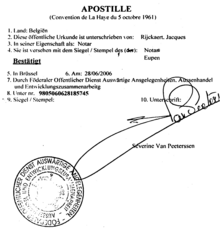Apostille
The apostille (origin of the word Greek - Neo-Latin ), also known as the Hague apostille , is a form of certification in international document traffic . It is used in legal relations between those states that are members of the multilateral Hague Convention No. 12 for the Exemption of Foreign Public Documents from Legalization . It confirms the authenticity of the signature, the capacity in which the signatory acted and, if applicable, the authenticity of the seal or stamp with which the document is affixed (Article 3 of the Convention).
history
The apostille is the form of authentication or legalization introduced between the contracting or member states of the multilateral convention number 12 of the Hague Conference on Private International Law in 1961. The simplification of legal relations, which could be achieved with this convention, contributes significantly to the development of globalization today , because it enables international legal channels to be swift and unbureaucratic.
functionality
The apostille is placed on public documents. Article 1 of the Convention regulates which documents are to be regarded as public documents, whereby the national law of the issuing authority applies. The apostille must be represented by means of a stamp (stampiglie) in the shape of a square with a side of at least nine centimeters. It can be completed in the official language of the issuing authority. The heading “Apostille (Convention de La Haye du 5 octobre 1961)” is mandatory in French (Article 4). Since 2007, the Hague Conference is building in cooperation with the Association of American Lawyers (National Notary Association) an Internet application from which the Administration tab out and the Apostille can be issued in electronic form. This will make it possible in the future to check the correctness of the creation of an apostille at any time and anywhere in the world. The apostille is only issued by the respective state authorities for documents from the field of public administration. In Germany and Austria, the courts in Germany and Austria issue the apostille for private and public documents that are notarized or certified by a court. The respective ministries (or senate administrations) for justice are also partly responsible for this. Only administrative bodies operate in Switzerland.
The procedure for certification by apostille comes according to However, Article 8 of the Convention only applies if the otherwise applicable provisions were stricter. If, on the other hand, these provisions are lighter, or if they grant complete exemption from legalization, then the Hague Legalization Convention must not lead to any deterioration.
Members of the convention
The number of contracting and member states is currently 117. The accession of a new state requires the deposit of the accession instrument with the Ministry of Foreign Affairs of the Netherlands. After an "admission routine" has been carried out, membership takes effect. Other member states have raised objections to the accession of several states. These objections are justified by the fact that states want to protect their own people from disadvantages. In these cases, the accession of the contested countries only becomes ineffective in bilateral relationships with the opposing states. In relation to the other member states, however, the accession comes into full force. Germany has raised objections against Azerbaijan , Burundi , the Dominican Republic , India , Kyrgyzstan , Kosovo , Liberia , Morocco , Moldova (official German name: Moldau), Mongolia , Paraguay , Tajikistan , Tunisia and Uzbekistan . In the bilateral relationship between the Federal Republic of Germany and these states, the apostille is therefore not used. The convention is currently only in force for 101 states in the Federal Republic of Germany. In the rest of the German-speaking area, different provisions apply. Austria has only raised objections against the Dominican Republic, Kyrgyzstan, Mongolia and Uzbekistan. This means that German documents that are affected by these restrictions can in many cases be certified in Austria and provided with the apostille. As a result of the complete exemption from authentication between the Federal Republic of Germany and Austria, such documents issued in Austria are unrestrictedly effective and valid in the Federal Republic of Germany.
The multilateral agreement was originally concluded for a period of five years. Except in the case of termination, it is tacitly extended for a period of five years. The archivist is the government of the Netherlands. The membership is currently growing steadily and already includes many large and important economic areas. The Convention was drawn up in French and English. In the event of a dispute, the French version applies. A joint official German translation has been produced for use in Germany and Austria.
literature
- Wolfgang Vatter: Contracts and documents in legal dealings with foreign countries. , Loose-leaf collection - December 2011; ISBN 3-214-10668-6
Web links
- Full text of the Convention in the official translation agreed between Germany and Austria.
- HCCH status table: States parties to the Convention
- Foreign Office of the Federal Republic of Germany on "Legalization and Apostille"
- Text of the contract and list of countries for which the apostille rule applies to Germany, with reference in Federal Law Gazette II
- List of countries (in many cases historical) to which the apostille rule applies to Austria, with reference in BGBl.
Individual evidence
- ↑ Apostille - meaning, spelling, grammar, origin . duden.de. Retrieved May 6, 2012.
- ↑ Hague Apostille . IHK Fulda. Retrieved August 15, 2018.
- ^ Title and text of the Convention
- ^ Hague Conference on Private International Law: 12th Convention on the Exemption of Foreign Public Documents from Legalization, October 5, 1961. Accessed January 12, 2014
- ↑ Kansas Sends First Electronic 'Apostille' Certificate, "Notary Bulletin," December 30, 2013 (in English)
- ^ Hague Conference on Private International Law: Status Table
- ↑ List of states of the Federal Foreign Office on the Apostille Convention

